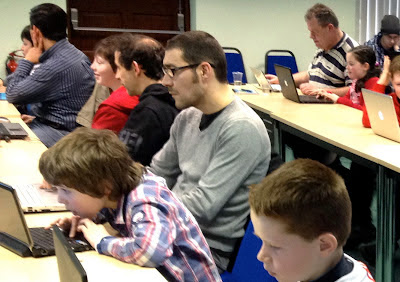 |
| Mercy Secondary School students with Ina O'Murchu at 'Women in Technology' event at DERI NUIG |
Coders Needed to Make the much vaunted Knowledge Society a reality
“Ireland needs computer
programmers of both sexes to help lay the foundations of the ‘Knowledge
Economy’ and to create the jobs for a sustainable future,” says Myriam Leggieri,
DERI researcher and one of the chief organisers. “But there is in particular a serious
shortage of female IT developers in Ireland and across the world as well as in
the professions of science, technology, engineering and maths (STEM)
professions generally. Events such as 'Rails Girls' directly address this issue
and empower girls to take the first step in learning these in-demand skills and
acquiring the tools to conquer one of the last great frontiers of science,
namely the World Wide Web.”
The organisers comprise mainly
young female IT researchers involved in local third level colleges, businesses,
schools and volunteer digital makers’ clubs such as Coderdojo and 091Labs.
Though primarily aimed towards local female students particularly in post
primary schools and third level colleges, nevertheless there will be attendees
arriving from across Ireland and Britain. The weekend event is free, is open to
all enthusiastic girls and women, and is suitable for absolute beginners to
computer coding. No prior knowledge of programming is required.
 |
| Alanna from 091Labs |
This event is part of a radical technology
learning transformation of the city.
Huge Interest in Learning to Code amongst Galway's Youth
Every Saturday morning at NUI Galway and other locations in Athenry and Kinvara, hundreds of enthusiastic children and teenagers create their very own games, digital stories and web projects mentored by the young volunteer mentors of Coderdojo.
Youth-run clubs such as
091 Labs are also providing informal after-school digital
maker’s environments. Thanks to
the combined efforts of volunteer tutors from Hewlett Packard, Avaya, GMIT,
Medtronic, SAP and DERI working under the guidance of the Galway Education
Centre supported by the work of the Galway Science and Technology Forum and
Junior Achievement, approximately two thousand pupils and students in over 50 primary
and post-primary schools across counties Mayo and Galway are currently being
educated in computer programming.
Recognition of the importance of these developments
is shown by the recent inaugural ‘John
Cunningham Memorial Coderdojo Awards’ granted to young coders for
their outstanding contributions to computer programming; the Boston Scientific
‘Coding the Big Bang’ awards; and
ITAG’s new ‘IT in the Community
Award’ that was won by Coderdojo Galway city.
Huge Interest in Learning to Code amongst Galway's Youth
Every Saturday morning at NUI Galway and other locations in Athenry and Kinvara, hundreds of enthusiastic children and teenagers create their very own games, digital stories and web projects mentored by the young volunteer mentors of Coderdojo.
 |
| Coderdojo Class in DERI on Saturday mornings |
 |
| Transition Year students Davitt College Castlebar learning to code with Brendan Smith DERI |
Birth of Ireland's First Generation of Coders
The end result is that finally,
five decades after the tentative introduction of computing into Irish schools,
we are experiencing the first generation of children that can code, that are
truly ‘digital creators’ rather than just passive ‘digital users’.
Galway: Ireland's primary Science City
These developments are part of an even bigger picture of progressive change where the city can truly claim to be Ireland's oldest Digital City and probably its premier City of Science having in the process the potential to become the Silicon Valley of Ireland. See my article on this subject by clicking here
Location for leading International & National Science Research & Science Education centres.
Galway is now the location for the Computer and Communications Museum of Ireland (based at DERI NUIG), the national Marine Institute, the National Aquarium (Galway Atlantaquaria), Ireland's longest (2 weeks) annual Science and Technology Festival and the world's largest semantic web research institute (DERI). It was to Galway rather than to Dublin or to Cork that CERN, the world’s largest particle physics laboratory, sent their renowned interactive exhibition last September. It was hugely sucessfull and was visited by 12,000 post-primary school students from across the island.
Interestingly the DERI-based computer museum hosts an exhibit dedicated to women (hidden histories) that were pioneers in communications and computer technologies but are largely unknown by the general public.
 |
| Retro Gaming event Computer Museum, DERI |
Galway: Ireland's primary Science City
These developments are part of an even bigger picture of progressive change where the city can truly claim to be Ireland's oldest Digital City and probably its premier City of Science having in the process the potential to become the Silicon Valley of Ireland. See my article on this subject by clicking here
Location for leading International & National Science Research & Science Education centres.
Galway is now the location for the Computer and Communications Museum of Ireland (based at DERI NUIG), the national Marine Institute, the National Aquarium (Galway Atlantaquaria), Ireland's longest (2 weeks) annual Science and Technology Festival and the world's largest semantic web research institute (DERI). It was to Galway rather than to Dublin or to Cork that CERN, the world’s largest particle physics laboratory, sent their renowned interactive exhibition last September. It was hugely sucessfull and was visited by 12,000 post-primary school students from across the island.
Interestingly the DERI-based computer museum hosts an exhibit dedicated to women (hidden histories) that were pioneers in communications and computer technologies but are largely unknown by the general public.
 |
| Retro Gaming event Computer Museum, DERI |




















